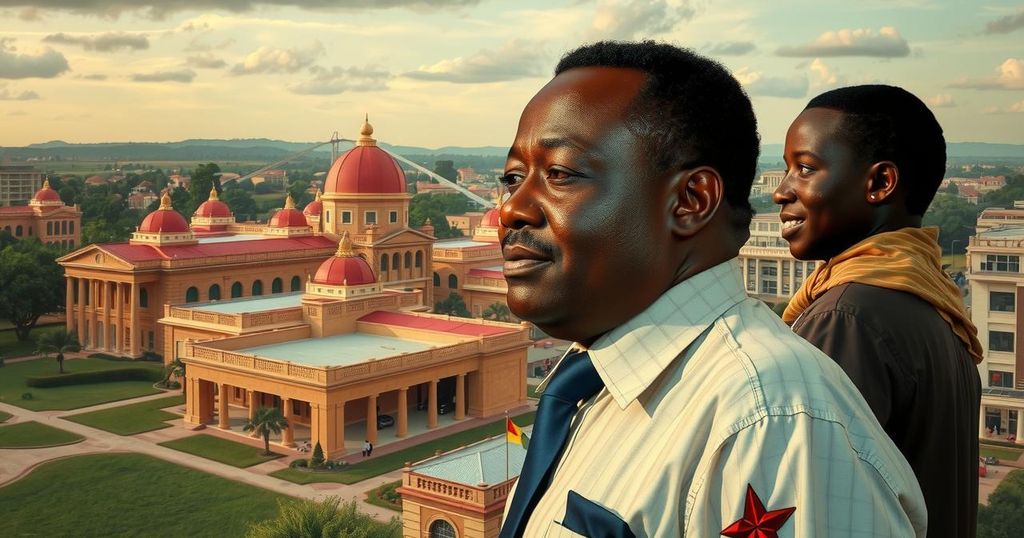World news
AFRICA, AKUFO - ADDO, BAWUMIA, DAKAR, ELECTION, GHANA, GOVERNANCE, GOVERNMENT, JOHN DRAMANI MAHAMA, MAHAMA, MAHAMUDU BAWUMIA, N. D. C, N. P. P, NANA AKUFO - ADDO, NATIONAL DEMOCRATIC CONGRESS, NEW PATRIOTIC PARTY, PRESIDENTIAL ELECTION 2024, SENEGAL, SUCCESSION PLANNING
Lena Nguyen
0 Comments
Ghana’s Election: A Critical Decision Amid Economic Crisis
In Ghana’s impending election, voters face a choice between Vice President Mahamudu Bawumia and former President John Dramani Mahama amid a severe economic crisis. With inflation and poverty rising, particularly affecting the youth, over 700,000 first-time voters may greatly impact the election results. Predictions favor Mahama, but Bawumia’s ties to the current administration present challenges. Polls will close on December 7, with results expected shortly thereafter.
Ghanaians are gearing up for critical elections on Saturday, choosing between Mahamudu Bawumia, the vice president backed by outgoing president Nana Akufo-Addo, and John Dramani Mahama, a former president seeking redemption after his previous term ended in 2016. With a nation grappling with severe economic challenges—including rampant inflation, rising poverty, and widespread youth discontent fueled by environmental degradation from illegal mining—this election serves as a referendum on the effectiveness of past governance. Notably, over 700,000 first-time voters, primarily from Generation Z, are expected to shape the outcome, swayed by feelings of frustration and a desire for change.
The economic landscape of Ghana has deteriorated significantly, described by experts as the worst crisis in a generation. Following years of rising national debt and a borrowing spree, the government has defaulted on its debt, leading to soaring inflation and worsening living standards for millions. The youth bulge in Ghana, whose futures are being jeopardized by economic mismanagement and environmental destruction, is poised to wield considerable influence in deciding the next leader. Analysts note the lack of ideological distinctions between the two major parties, further complicating voters’ choices.
In contrast to many nations in the region, Ghana maintains a relatively stable democracy, having been a beacon of peace in West Africa. However, insecurity and the potential for extremism loom overhead as the situation in neighboring regions becomes increasingly unstable. Challenges remain as Ghana addresses not only its internal economic crises but also external pressures related to regional security threats.
Poll predictions favor Mahama to reclaim the presidency, yet his opponent Bawumia’s performance within the current administration poses challenges. The voting process, anticipated to attract a higher turnout than in the last election, will conclude by 5 p.m. on December 7, and results are expected to emerge shortly thereafter. A majority vote is necessary for victory, with the possibility of a runoff should no clear winner emerge.
The upcoming elections are underscored by mounting pressure from the public regarding economic struggles in Ghana. Over recent years, the country has experienced unprecedented inflation, increased national debt, and a burgeoning unemployment rate, which have driven the populace into poverty. High interest in the elections is especially evident among the youth, comprising a significant portion of first-time voters who are motivated by progressive principles and a desire for improved governance. Environmental issues, notably stemming from illegal mining practices, have further exacerbated dissatisfaction among the younger demographic and fuelled protests against the government’s failure to act. Ghana’s historical context of stable democracy adds an interesting dimension to the upcoming electoral decision.
As Ghanaians prepare to vote, the choice between Bawumia and Mahama represents not only a question of leadership but also a critical juncture for a nation in crisis. Economic challenges, particularly affecting the youth and the environment, will be pivotal in influencing voter sentiments. The outcome of this election may serve as a barometer for public trust in established political parties and their ability to address pressing issues, potentially heralding significant change within Ghana’s socio-political landscape.
Original Source: www.nytimes.com




Post Comment